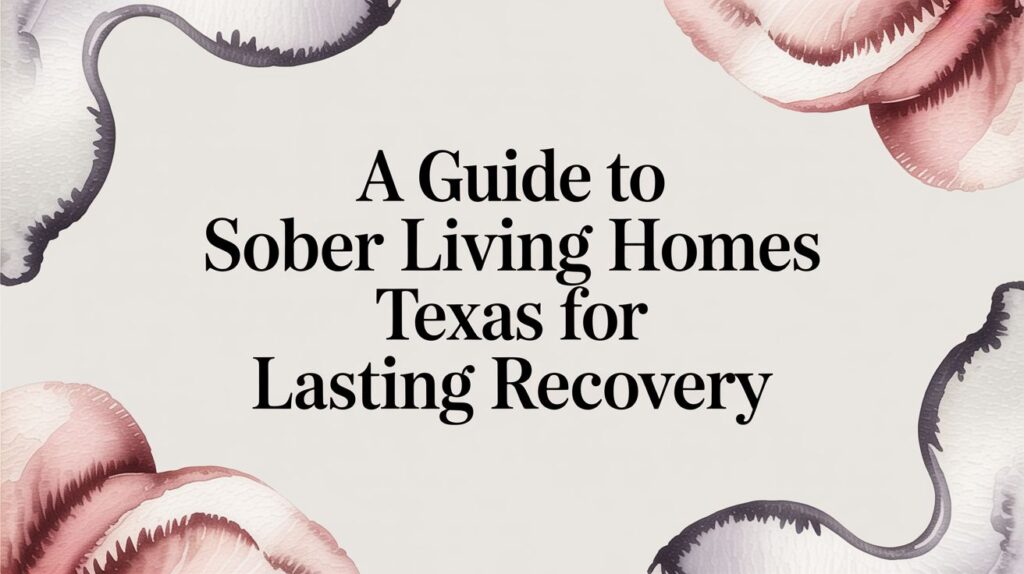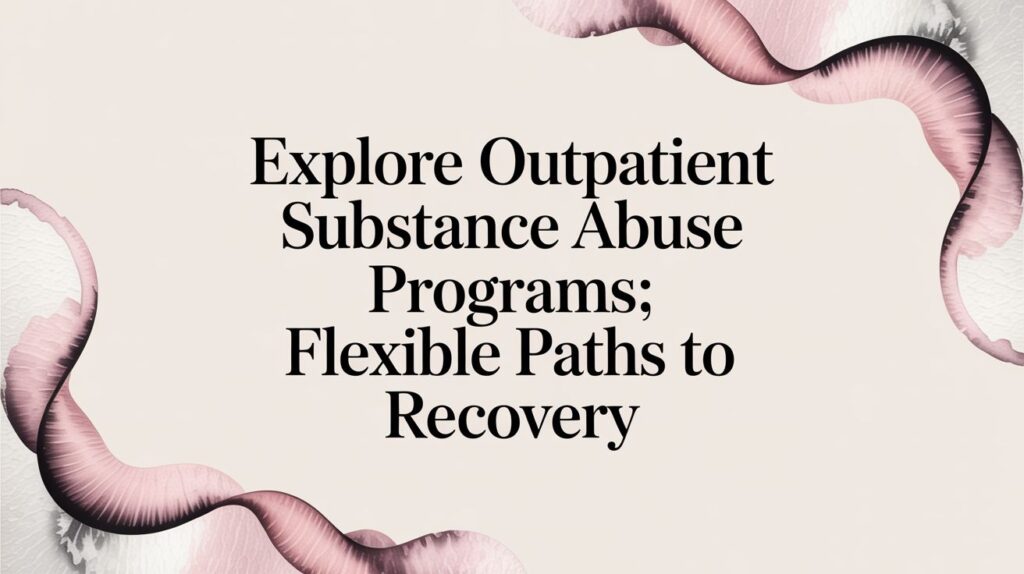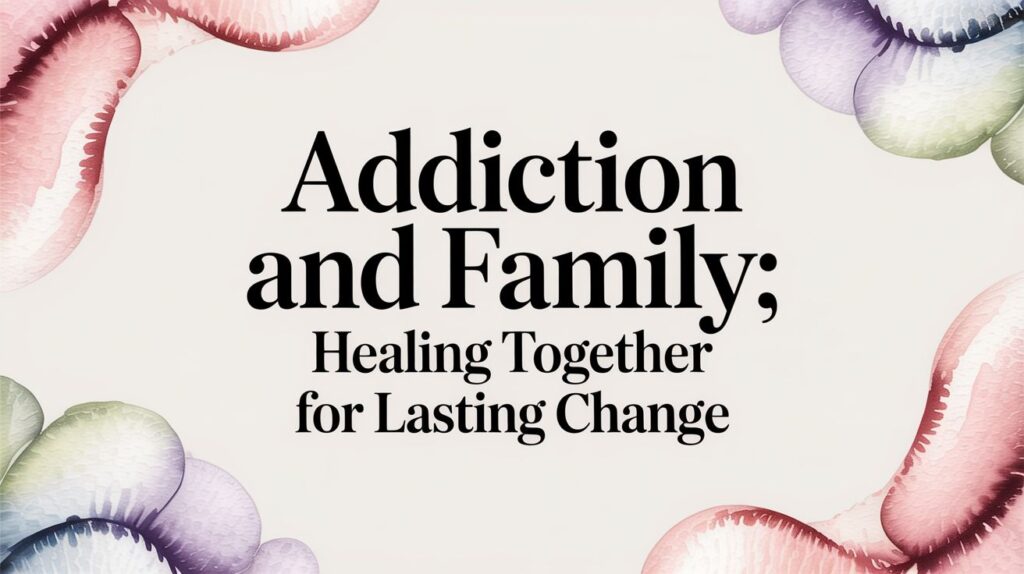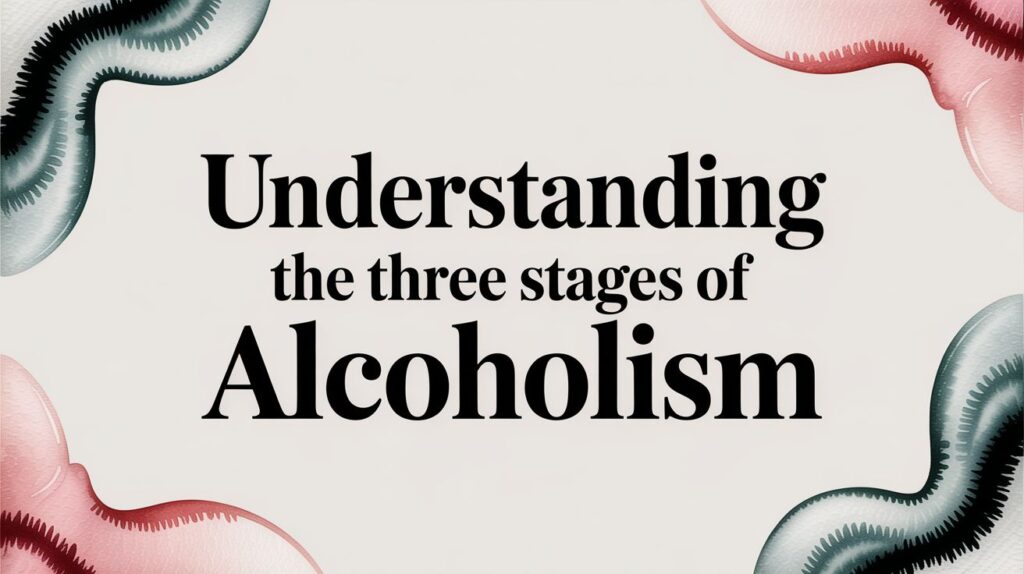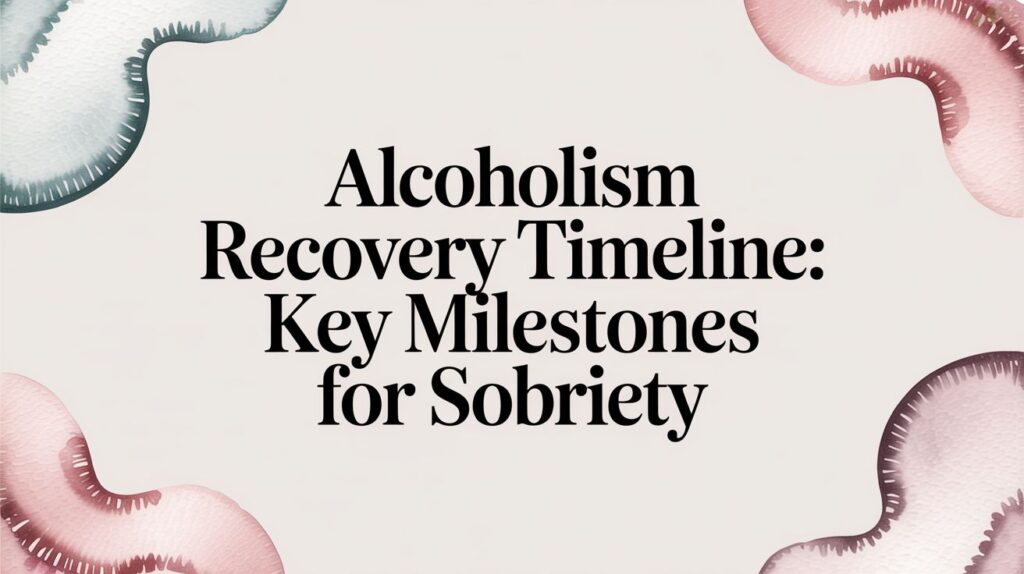If you're looking into recovery options, the term "outpatient drug rehab in Houston" probably keeps popping up. Let's break down what that actually means. It’s not about checking into a facility and putting your life on hold; instead, it's a structured recovery program designed to weave directly into your daily routine. You get professional, expert care while still living at home, going to work, and being there for your family.
What Outpatient Rehab in Houston Really Looks Like

Think of it like this: you're building a bridge back to a healthier life, but you don't have to leave everything behind to do it. That's the whole idea behind outpatient drug rehab. Unlike inpatient programs where you live on-site, outpatient care is all about integration. You'll go to a treatment center for therapy and medical support for a certain number of hours each week, but you head home at the end of the day.
This approach is a game-changer in a city like Houston, where life doesn't stop. Juggling a job, family, and other commitments is the norm here, and for most people, hitting "pause" on all of that just isn't realistic. Outpatient treatment offers a practical path forward, allowing you to start recovery without stepping away from your entire world.
Who Benefits from This Flexible Model?
Outpatient care is a fantastic option, but it's most effective for people with a solid, supportive home life. It’s a great fit for someone who has completed an inpatient program and is ready for the next step, or for individuals whose struggles with substance use are less severe but still need professional guidance.
So, who is the ideal candidate? It usually comes down to a few key things:
- They have a strong support network of family or friends.
- They are genuinely motivated and ready to engage in their recovery.
- They don't need a medically supervised detox or round-the-clock monitoring.
- They have work, school, or family obligations they must continue.
Addressing Houston's Unique Needs
Being a major city, Houston faces some serious challenges when it comes to substance use. It's designated as a high-intensity drug trafficking area, which fuels the need for accessible and effective treatment. The numbers are staggering—in a single year, law enforcement seized 1.5 tons of cocaine and over 100 tons of marijuana.
On top of that, local surveys show that nearly 12% of Houston-area residents aged 12 and older have used illicit drugs in the past year. These local addiction statistics paint a clear picture of why flexible, real-world treatment options are so vital for our community.
By offering a less disruptive path to healing, outpatient drug rehab in Houston provides a lifeline for thousands. It empowers people to tackle addiction head-on while remaining rooted in the very communities where they are rebuilding their lives.
This practical approach makes sure help is available right where it’s needed most.
Finding Your Footing: The Different Levels of Outpatient Care
When people talk about outpatient drug rehab in Houston, they aren't talking about a one-size-fits-all program. It's really a spectrum of care, with different levels of intensity designed to meet you exactly where you are in your recovery journey.
Think of it like physical therapy after an injury. You might start with intensive, frequent sessions and then, as you get stronger, gradually scale back to less frequent check-ins. The goal is to find the right amount of support for your specific situation.
Standard Outpatient Programs (OP)
On the most flexible end of the spectrum, you have Standard Outpatient Programs, or OP. This is the least time-intensive option, usually involving just a few hours of therapy or counseling each week. It's a lot like having a regular check-in with a specialist.
OP is often a great fit for people who have already completed a more structured program and are looking for that consistent support to maintain their sobriety. It can also work for someone with a less severe substance use issue who has a rock-solid support system at home and is highly motivated to change. The main goal here is reinforcing recovery skills and preventing relapse.
Intensive Outpatient Programs (IOP)
Taking a step up in structure and time commitment, you'll find Intensive Outpatient Programs (IOP). An IOP provides a much deeper level of support than a standard OP but still gives you the flexibility to manage your daily life—like work, school, and family. It’s a powerful middle ground.
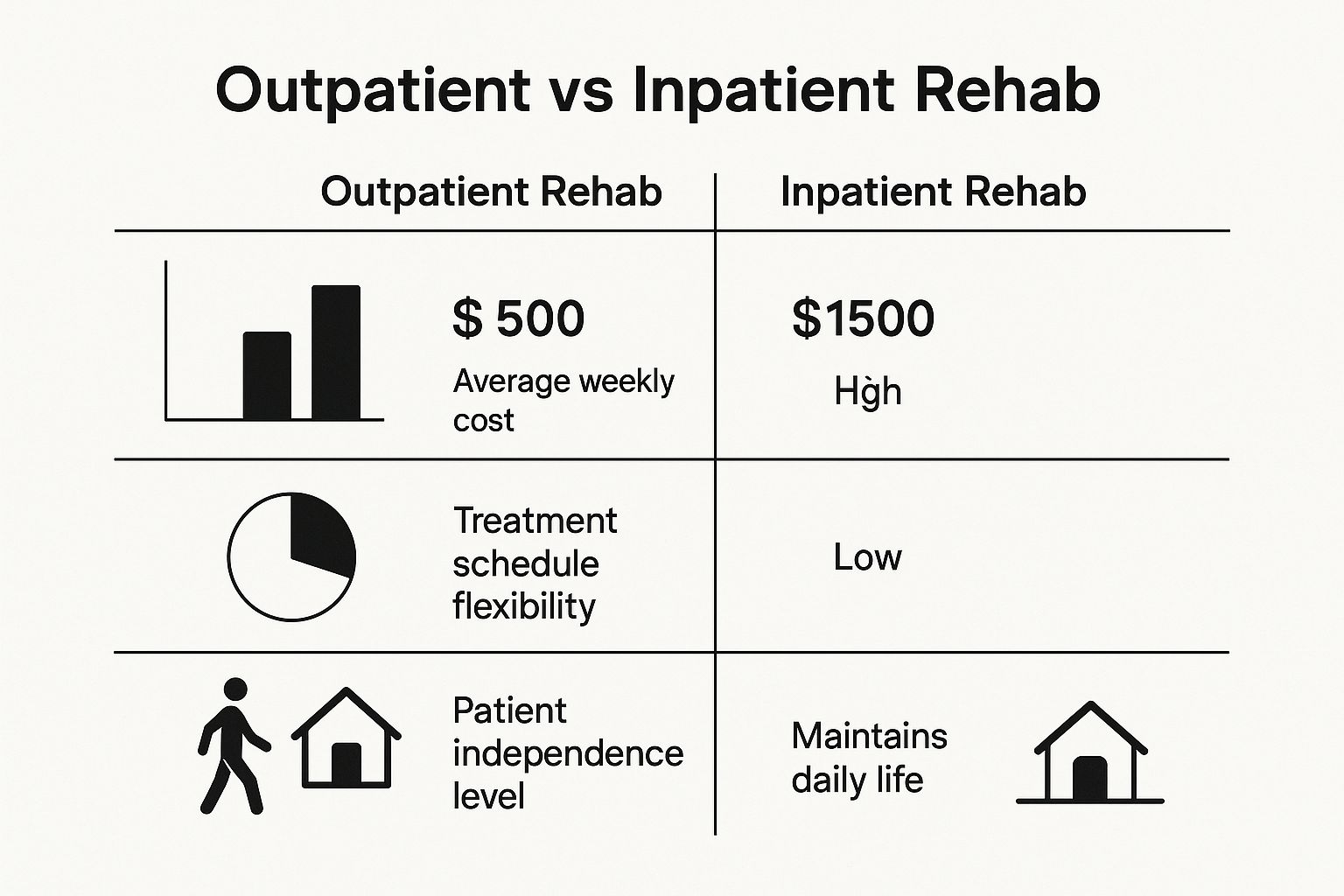
Typically, an IOP involves about 9 to 20 hours of treatment per week, spread over a few days. During this time, you'll likely participate in:
- Group Therapy: This is the heart of most IOPs, giving you a chance to connect with others who understand what you're going through.
- Individual Counseling: Private, one-on-one sessions to work through your personal triggers and challenges.
- Educational Workshops: Classes that teach you practical skills for managing cravings, handling stress, and understanding the science behind addiction.
- Family Therapy: Sessions designed to help heal relationships and build a stronger support network at home.
This level of care is ideal for those who need more than just a weekly therapy session but don't require 24/7 medical monitoring. If you'd like to explore this option further, we have a guide that explains what an Intensive Outpatient Program is in more detail.
Partial Hospitalization Programs (PHP)
At the highest and most intensive level of outpatient care is the Partial Hospitalization Program (PHP). A PHP essentially serves as a bridge between 24/7 inpatient care and traditional outpatient treatment. You can think of it as making recovery your full-time job.
PHP provides the same therapeutic intensity you'd find in a residential program, but with the crucial difference that you return home at the end of the day. This allows you to start applying the new coping skills you’re learning in your real-world environment right away.
Clients in a PHP typically attend treatment for several hours each day, often 5 to 7 days a week. This immersive structure is best for individuals facing significant substance use disorders or co-occurring mental health conditions. It’s for those who need daily clinical support but have a safe and stable home to return to each night.
Comparing Outpatient Program Levels in Houston
To make it easier to see the differences at a glance, this table breaks down the key features of each program level available right here in Houston.
| Program Level | Typical Weekly Commitment | Treatment Focus | Best Suited For |
|---|---|---|---|
| Standard Outpatient (OP) | 1-3 hours | Long-term sobriety maintenance, relapse prevention, and ongoing support. | Individuals with mild substance use issues or those stepping down from a higher level of care. |
| Intensive Outpatient (IOP) | 9-20 hours | Building foundational recovery skills, group processing, and structured support. | Those needing more than weekly therapy but who have work, school, or family obligations. |
| Partial Hospitalization (PHP) | 20+ hours | Intensive daily therapy, stabilizing co-occurring disorders, and crisis management. | Individuals who need a high level of care but have a stable home environment; often a transition from inpatient treatment. |
Understanding these distinctions is the first step in finding a program that not only fits your schedule but also provides the right level of support to build a strong and lasting foundation for recovery.
Why Choose Outpatient Rehab for Your Recovery
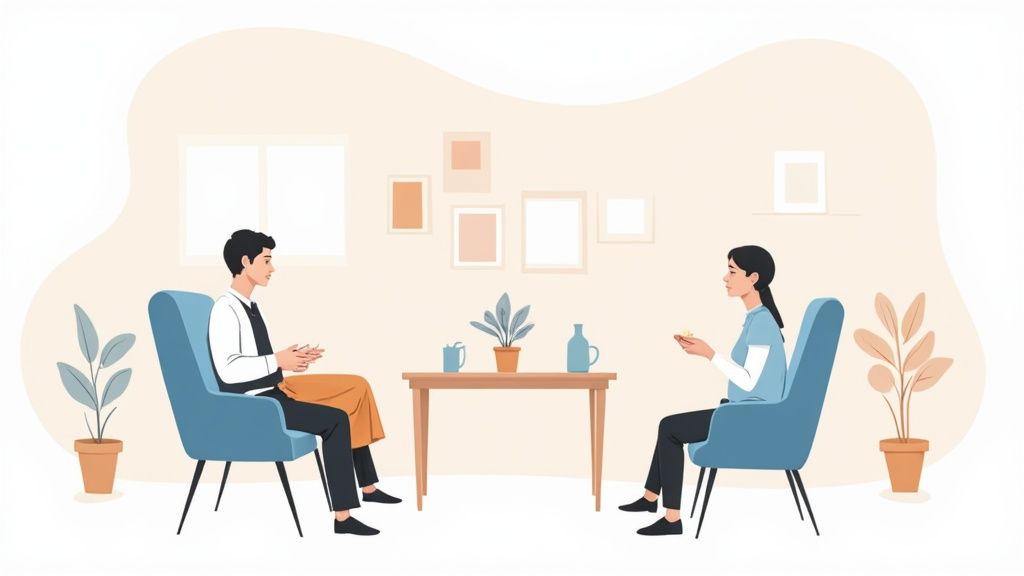
Choosing the right path to recovery is one of the most important decisions you'll ever make. Outpatient treatment offers a powerful alternative to traditional inpatient programs, blending professional, evidence-based care with the ability to stay connected to your daily life.
The whole idea is built around a simple but profound concept: you don't have to put your life on pause to heal. In fact, for many people, healing is most effective when it happens right in the middle of it. This approach brings some very real, practical advantages that make recovery not just a goal, but a manageable reality.
Affordability and Accessibility
Let's be honest—cost is a huge hurdle for many people seeking help. Residential rehab provides intensive, round-the-clock care, but that level of support comes with a price tag that can be out of reach for many Houston families.
Outpatient programs are simply more affordable. Because you live at home, the costs associated with housing, meals, and 24/7 staffing are eliminated. A national survey found the average cost for outpatient care to be around $8,386, which is a fraction of the $50,000 or more that residential programs can cost. This difference in cost opens the door to high-quality care for so many more people.
Applying Skills in Real Time
Think of it like learning to ride a bike. You can watch videos and read books about balance and pedaling, but you only truly learn when you get on the bike and start pushing. Recovery is a lot like that.
Outpatient rehab gives you the unique chance to learn new coping strategies in a therapy session and then go out and use them that very same day. When you encounter a trigger at the office or face a stressful family dynamic in the evening, you have fresh tools ready to go. This immediate, real-world practice is what helps build strong, lasting recovery skills that actually stick.
The real magic of outpatient rehab is how it closes the gap between the therapy room and your everyday world. You're not just learning in theory; you're actively practicing in the moments that matter, building confidence with every small victory.
Maintaining Life's Responsibilities
For most of us, life doesn't stop. We have jobs to go to, families to care for, and classes to attend. Stepping away completely for 30, 60, or 90 days just isn't an option.
Outpatient drug rehab in Houston is specifically designed for real life. With flexible schedules that often include evening and weekend options, you can get the critical support you need without derailing your entire life.
- Keep Your Job: Continue your career and maintain that all-important financial stability.
- Care for Your Family: Stay present for your children, spouse, and other loved ones.
- Stay in School: Keep pursuing your education without missing a beat.
Recovery is about more than just overcoming physical dependence; it's also about navigating the psychological challenges of addiction recovery. For some, that journey also involves managing physical cravings, which is where medication can play a key role—you can learn more by reading our guide on what medication-assisted treatment is. By weaving treatment into your daily routine, you learn to manage these challenges holistically, creating a sense of normalcy and empowerment from day one.
Your Step-by-Step Guide to the Treatment Process
Starting the journey to recovery can feel like standing at the base of a mountain, unsure of the path ahead. Knowing what to expect, step-by-step, can make all the difference. It takes the guesswork out of the equation and lets you focus on what really matters: your healing. Think of the path through an outpatient drug rehab in Houston as a structured, supportive experience designed to meet you right where you are.
The entire process is built around one core idea: you are unique. Your story isn't the same as anyone else's, so your treatment plan shouldn't be a one-size-fits-all solution. It’s more like a custom-tailored suit than something off the rack—it has to fit your specific history, your current needs, and your hopes for the future.
The First Step: Intake and Assessment
Your journey begins not with a test, but with a conversation. This first meeting is a confidential, compassionate intake and assessment where the clinical team simply gets to know you. It's not an interrogation; it's a collaborative effort to get a clear picture of your situation.
During this assessment, you’ll talk through things like:
- Your history with substance use.
- Your overall physical and mental health.
- Your family life and personal support system.
- What you hope to achieve through recovery.
From this honest conversation, the team will work with you to craft a personalized treatment plan. This becomes your roadmap, outlining the exact therapies and support services that will give you the best shot at lasting success.
Engaging in Core Therapies
With your roadmap in hand, you'll dive into the heart of the treatment process: therapy. This is where the real work of healing happens. Outpatient programs in Houston use a mix of proven, evidence-based methods to help you get to the root of your addiction and build new, healthier ways to cope with life.
You’ll likely take part in several different kinds of therapy. Each one offers a unique perspective and type of support, and they all work together to create a strong foundation for your recovery.
"The goal of therapy isn't just to stop using substances; it's to build a life you don't feel the need to escape from. It’s about rediscovering yourself and learning to navigate life's challenges with resilience."
This well-rounded approach makes sure you're supported from every angle, addressing both the psychological and behavioral sides of addiction. For a deeper dive into how this all comes together, our guide on how rehab works breaks it down even further.
Understanding Your Therapeutic Toolkit
Just as a carpenter needs more than just a hammer, effective recovery requires a variety of therapeutic tools. Here are some of the most common and powerful approaches you’ll find at an outpatient drug rehab in Houston:
- Individual Therapy: These are your one-on-one sessions. It's a private, safe space to work with a licensed therapist to explore personal triggers, past trauma, and anything else that's holding you back.
- Group Therapy: Often a cornerstone of outpatient care, group sessions connect you with others who understand what you're going through. There's incredible power in realizing you're not alone in this fight.
- Cognitive Behavioral Therapy (CBT): This is a very practical, goal-focused therapy. CBT helps you spot and change the negative thought patterns and automatic behaviors that fuel addiction. It’s like learning how to rewire your brain’s response to stress and cravings.
- Family Therapy: Addiction is a family affair—it affects everyone. These sessions are designed to heal broken trust, improve communication, and teach your loved ones how they can best support you on this journey.
Planning for Life After Treatment
A good treatment program doesn’t just end on your last day. In fact, the final phase is one of the most important: creating a solid aftercare plan. This is your personal strategy for protecting your sobriety as you step back into your daily life.
This stage is all about building a sustainable support network. Your team will help you connect with local Houston resources, like alumni groups, sober living homes, or ongoing counseling. You’ll also map out a concrete plan for handling high-risk situations and managing cravings, ensuring you feel prepared for what comes next.
This proactive planning means you leave treatment not with an ending, but with a new beginning—fully equipped with the tools, confidence, and community support you need to thrive.
How to Find the Right Houston Rehab for You
Choosing an outpatient drug rehab in Houston feels like a massive decision, especially when you're already juggling so much. With so many centers out there, how do you find one that truly gets you and offers the best possible care? Making the right choice now lays the groundwork for a successful, lifelong recovery.
Think of it like picking a specialist for a critical health issue. You wouldn’t just go with the first name on a list. You'd dig into their qualifications, understand their approach, and make sure they have the experience to handle your specific situation. Selecting a rehab center deserves that same careful consideration.
Verify Licensing and Credentials
First things first: make sure the facility is legitimate. Your starting point should be confirming they are licensed by the State of Texas. An even better sign is accreditation from a national body like The Joint Commission or CARF International. This isn't just about red tape; it proves the program is held to a high standard for safety, quality, and ethical treatment.
Next, look at the people who will actually be guiding you. A great program will be proud of its team and transparent about their credentials. You should see licensed professionals on staff, such as:
- Licensed Professional Counselors (LPCs)
- Licensed Clinical Social Workers (LCSWs)
- Licensed Chemical Dependency Counselors (LCDCs)
- Psychiatrists or medical doctors for any medication needs
A team with a mix of specialized backgrounds is far better prepared to navigate the complexities of addiction and any mental health issues that come with it.
Inquire About Treatment Philosophy and Methods
Every rehab has a philosophy, a core belief that shapes its entire program. It’s vital to find one that clicks with you. Some centers build their programs around 12-step principles, while others lean more heavily on evidence-based therapies like Cognitive Behavioral Therapy (CBT) or Dialectical Behavior Therapy (DBT). There's no single "right" way, only what's right for you.
Don't hesitate to ask direct questions. What’s their client-to-counselor ratio? A lower number is a huge plus, as it means you’ll get more one-on-one attention. Also, ask if they specialize in treating co-occurring disorders, often called a dual diagnosis. Since substance use often goes hand-in-hand with anxiety, depression, or trauma, addressing both at the same time is key to getting better and staying better.
Finding a program that can treat both substance use and mental health isn't a bonus—it's a necessity. Integrated treatment provides a much stronger foundation for healing by getting to the root causes of addiction, not just its symptoms.
Consider the Practical Logistics
Once you're confident in a program's quality, it's time to get real about the day-to-day details. The most amazing program on paper is useless if you can't actually get there and participate consistently.
Run through this quick checklist:
- Location and Accessibility: Is the center reasonably close to your home or work? A painful commute can become a major obstacle to showing up every day.
- Scheduling Flexibility: Does the schedule work with your life? Many of the best outpatient drug rehabs in Houston offer evening or weekend sessions specifically for people with jobs or school commitments.
- Insurance and Cost: Be direct about money. The admissions team should be able to verify your insurance benefits and give you a clear breakdown of what's covered and what you'll need to pay yourself. No surprises.
- Program Environment: If you can, take a tour. Does the place feel safe? Is it clean and welcoming? The atmosphere makes a huge difference in how comfortable you'll feel opening up and doing the hard work.
This is a big decision, but it doesn't have to be an overwhelming one. By tackling it one step at a time, you can find a quality outpatient program in Houston that feels like a genuine partner in your recovery.
Building Your Local Support System After Treatment

Graduating from an outpatient program is a huge accomplishment, and it deserves to be celebrated. But it’s important to see this moment for what it is: not the finish line, but the starting line for a new way of living. The real work of maintaining long-term sobriety begins the day you step out of structured treatment, and that work is fueled by the support system you build around yourself.
Think of it this way. Your time in rehab was like learning to fly with an instructor in a dual-control airplane. You learned the skills and practiced navigating turbulence in a safe, controlled environment. Aftercare is your first solo flight. You know what to do, but having a ground crew and air traffic control on the radio provides the confidence and guidance you need. A strong local support system in Houston is your ground crew.
Creating Your Post-Treatment Safety Net
Recovery isn’t a solo mission. It’s a journey that thrives on connection, community, and knowing you’re not alone. A solid aftercare plan is the safety net you weave to catch yourself when life throws its inevitable challenges your way. The best outpatient programs start helping you build this net long before your official graduation date.
This means identifying and getting connected with resources that offer ongoing encouragement, accountability, and a sense of belonging. The goal is simple: to make sure you never have to face a trigger, a craving, or just a really bad day by yourself. This safety net is a mix of people, places, and healthy routines that reinforce the life you’re building.
While outpatient drug rehab in Houston is a critical tool, staying the course can be tough. National data reveals that while about 42% of people in state-funded programs finish treatment, nearly 25% leave early. These numbers highlight just how crucial a strong support system is for keeping people anchored in their recovery long enough for it to stick.
Key Pillars of a Strong Houston Support System
Building a fulfilling life in recovery means intentionally surrounding yourself with positive, supportive influences. Here are the core components that make up a powerful local support network, right here in Houston:
- Ongoing Therapy: Continuing with individual counseling, even on a less frequent basis, gives you a professional, confidential space to work through challenges and sharpen your coping skills.
- Alumni Groups: Many treatment centers have vibrant alumni programs. These are fantastic for sober social events, finding a mentor, and connecting with others who truly get what you’ve been through.
- Peer-Led Meetings: Groups like Alcoholics Anonymous (AA), Narcotics Anonymous (NA), and SMART Recovery are the bedrock of recovery for millions. They’re free, widely available, and offer immediate support virtually anytime you need it.
- Sober Living Homes: For anyone needing a bit more structure as they transition back to daily life, a sober living home offers a drug-and-alcohol-free environment with built-in peer support and accountability.
A well-rounded support system addresses your clinical, social, and emotional needs. It turns recovery from a battle fought in isolation into a life lived in a supportive community.
By actively plugging into these resources, you’re not just trying to prevent a relapse—you’re building a richer, more meaningful life. This is especially vital when navigating the complexities of co-occurring disorders, as a strong community provides validation for both the addiction and mental health aspects of your journey. You can learn more about addiction and mental health treatment and why this dual support is so important.
Having this network firmly in place means you always have somewhere to turn, reinforcing the freedom you've worked so incredibly hard to achieve.
Got Questions About Outpatient Rehab? We’ve Got Answers.
Taking that first step toward recovery is a big deal, and it's completely normal to have a lot of questions. Getting clear, honest answers helps take the uncertainty out of the process, empowering you to choose the right path for yourself or a loved one. Here’s a look at some of the most common questions we hear about outpatient drug rehab in Houston.
How Long Does Outpatient Rehab Actually Take?
There’s no one-size-fits-all answer here, and that’s a good thing. Your treatment plan is built around you, not a rigid calendar. Think of it less like a school semester and more like physical therapy—you stay as long as it takes to heal and build strength.
Generally speaking, you can expect an Intensive Outpatient Program (IOP) to last around 8-12 weeks. A more structured Partial Hospitalization Program (PHP) might be shorter, perhaps 4-6 weeks, before you step down to a less intensive level of care. The most important thing is that a good program adapts to your progress, not the other way around.
Is Treatment in Houston Covered by My Insurance?
Most likely, yes. The good news is that nearly all major health insurance plans recognize outpatient rehab as an essential health benefit. The catch is that the level of coverage can differ quite a bit from one plan to another.
The easiest way to get a clear picture is to call the admissions team at any center you're considering. They're experts at this and can verify your benefits in just a few minutes. They’ll walk you through any potential out-of-pocket costs, like your deductible or copays, so you know exactly what to expect financially.
What’s the Real Difference Between Group Therapy and a Support Group like AA?
It’s a great question. Think of it this way: group therapy is a clinical session guided by a licensed therapist. It's part of your formal treatment plan, where you learn and practice proven techniques like Cognitive Behavioral Therapy (CBT).
On the other hand, support groups like Alcoholics Anonymous (AA) or Narcotics Anonymous (NA) are communities led by peers. They offer incredible fellowship and support from people who truly get it because they’ve been there. They aren't clinical treatment, but they are a vital piece of the puzzle. Most quality rehabs will strongly encourage you to participate in both to build the strongest possible foundation for recovery.
Can I Still Work While I’m in an Outpatient Program?
Absolutely. In fact, this is one of the main reasons people choose outpatient care. The programs are specifically designed to fit into your real life.
Many IOPs offer evening sessions or flexible scheduling options, making it entirely possible to get the help you need without having to put your job, school, or family commitments on hold. It’s all about integrating recovery into your life, not stopping your life for recovery.
At Altura Recovery, we know that treatment needs to work for you. Our outpatient programs in Houston are designed to provide top-tier clinical care that fits around your daily responsibilities. If you want to know more or feel ready to get started, contact us today to see how we can help you on your journey to healing.


